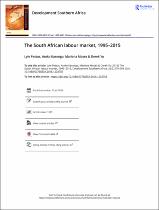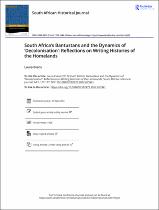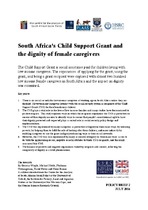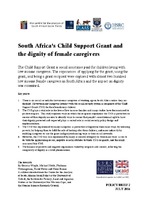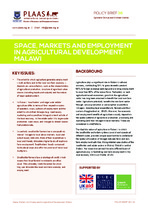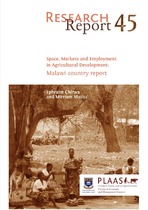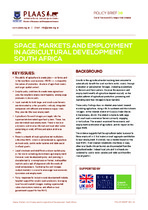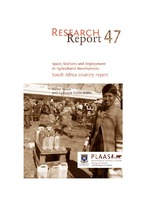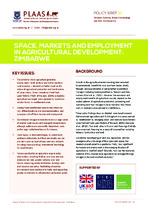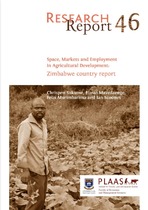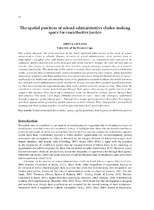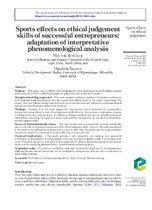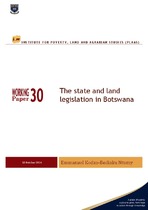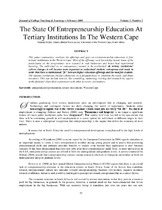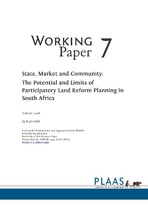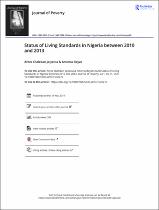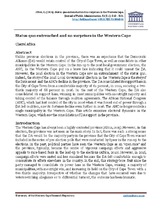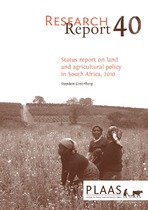Browsing Faculty of Economic and Management Sciences by Title
Now showing items 908-927 of 1095
-
The South African labour market, 1995–2015
(Taylor and Francis Group, 2016)This study investigates the changes in the South African labourmarket in the post-apartheid period. While unemploymentincreased over the 1995–2015 period, employment also increased.Nonetheless, the extent of employment ... -
South Africa’s Bantustans and the dynamics of “decolonisation”: Reflections on writing histories of the homelands
(Taylor and Francis Group, 2012)From the late 1950s, as independent African polities replaced formal colonialrule in Africa, South Africa’s white minority regime set about its own policy ofmimicry in the promotion of self-governing homelands, which ... -
South Africa’s Child Support Grant and the dignity of female caregivers
(Institute for Poverty, Land and Agrarian Studies, University of the Western Cape, 2014)The Child Support Grant (CSG) is social assistance for children with low income caregivers. It is currently paid at the rate of R310 per month and there are more than 11 million child beneficiaries. Almost all (98%) of ... -
South Africa’s Child Support Grant and the dignity of female caregivers
(Institute for Poverty Land and Agrarian Studies (PLAAS), 2014)The Child Support Grant is social assistance paid for children living with low income caregivers. The experiences of applying for the grant, using the grant, and being a grant recipient were explored with almost two hundred ... -
Space, markets and employment in agricultural development: Malawi
(Institute for Poverty, Land and Agrarian Studies, University of the Western Cape, 2015)Agriculture plays a significant role in Malawi’s national economy, contributing 35% to gross domestic product, 90% to foreign exchange earnings and providing employment to more than 80% of the labour force. Particularly ... -
Space, markets and employment in agricultural development: Malawi country report
(Institute for Poverty, Land and Agrarian Studies, University of the Western Cape, 2015)There is a growing literature on the links between farm and non-farm employment activities in rural societies and the important roles played by rural non-farm employment in poverty reduction (Lanjouw, 2001; Davis et al., ... -
Space, markets and employment in agricultural development: South Africa
(Institute for Poverty, Land and Agrarian Studies, University of the Western Cape, 2015)Growth in the agricultural sector has long been assumed to automatically benefit the rural non-farm sector, mainly through production or consumption ‘linkages’, including expenditure by farmers and their workers. However ... -
Space, markets and employment in agricultural development: South Africa country report
(Institute for Poverty, Land and Agrarian Studies, University of the Western Cape, 2015)Throughout much of the developing world, including sub-Saharan Africa, agriculture is frequently viewed as central to efforts to foster development and reduce poverty. Key conceptual and policy issues accordingly raised ... -
Space, markets and employment in agricultural development: Zimbabwe
(Institute for Poverty, Land and Agrarian Studies, University of the Western Cape, 2015)Growth in the agricultural sector has long been assumed to automatically benefit the rural non-farm sector, chiefly through various production or consumption expenditure ‘linkages’ including local expenditure by farmers ... -
Space, markets and employment in agricultural development: Zimbabwe country report
(Institute for Poverty, Land and Agrarian Studies, University of the Western Cape, 2015)Since independence in 1980, Zimbabwe has undergone several phases of land redistribution, generally to communal and working people. The latest phase was the Fast-Track Land Reform Programme (FTLRP), which began in 2000 ... -
The spatial practices of school administrative clerks: making space for contributive justice
(University of the Western Cape, 2012-12)The article aims to contribute to our analysis of social justice by suggesting that we broaden our focus on social justice to include issues of contributive justice. It highlights how those who are denied contributive justice ... -
Sports coaching in impoverished communities through the use of virtual reality
(IEEE, 2019)The paper explores the potential of virtual reality to aid sports coaching within poverty-stricken communities in South Africa. The use of virtual reality has been tested in education and in the mining industry but not in ... -
Sports effects on ethical judgement skills of successful entrepreneurs: Adaptation of interpretative phenomenological analysis
(Emerald, 2021)This paper aims to identify how entrepreneurs’ active involvement in sports/athletic training affects and adds to their overall ethical judgement skills within and outside the workplace.This study adopted a qualitative ... -
The state and land legislation in Botswana
(Institute for Poverty, Land and Agrarian Studies, University of the Western Cape, 2014-10)This paper aims to understand the political and legal dynamics involved in aspects of local government in Botswana as exemplified by legislative enactments. Mawhood (1985) suggests that such structures are charged with ... -
The state of entrepreneurship education at tertiary institutions in the Western Cape
(Clute Institute, 2008)This paper summarizes, analyses the offerings and gaps on entrepreneurship education at four tertiary institutions in the Western Cape. Most of the offerings were knowledge based. Some of the participants on the programmes ... -
State, market and community: The potential and limits of participatory land reform planning in South Africa
(Institute for Poverty, Land and Agrarian Studies, University of the Western Cape, 2008-10)Market-assisted land reform, as promoted by the World Bank, has made little progress in South Africa: since the advent of democracy in 1994, just 4 per cent of white-owned agricultural land has been redistributed to black ... -
State, market or the worst of both? Experimenting with market-based land reform In South Africa
(Institute for Poverty Land and Agrarian Studies (PLAAS), 2007)The concept of ‘market-based land reform’ (MBLR, also market-assisted land reform, or market-led agrarian reform) has been central to the ‘new wave’ of land reform that has been in evidence internationally since the early ... -
Status of living standards in Nigeria between 2010 and 2013
(Taylor and Francis Group, 2020)Nigeria experienced a drop in the poverty rate to an average of56.1% between 1999 and 2007. This could be attributed to themeasures taken by the civilian government against adminis-trative corruption, increased domestic ... -
Status quo entrenched and no surprises in the Western Cape
(South African Association of Public Administration and Management (SAAPAM), 2016)Unlike previous elections in the province, there was an expectance that the Democratic Alliance (DA) would retain control of the City of Cape Town, as well as consolidate in other municipalities in the Western Cape. In ... -
Status report on land and agricultural policy in South Africa
(PLAAS, University of the Western Cape, 2010)A strategy that seeks to insert smallholders into the large-scale, industrial, export-oriented model can only succeed in broadening and diversifying the producer base slightly. The large-scale model also brings ...

